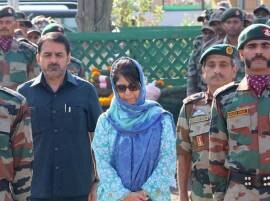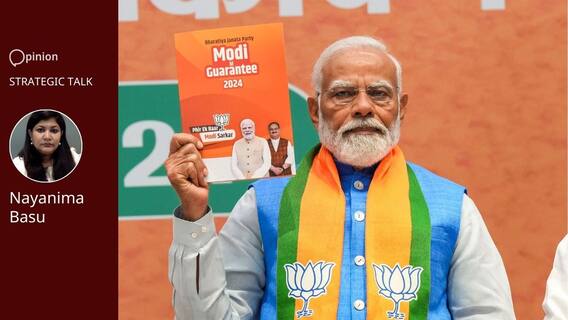Explorer
Advertisement

Resignation hints turmoil, challenge for Mehbooba

The sudden resignation of Tariq Hamid Karra, MP (Srinagar-Budgam), from Parliament as also from the membership of the People’s Democratic Party, on September 15, has put the PDP-BJP coalition under strain. Karra was one of the founding members of the PDP and served as Finance Minister under Mufti Mohammad Sayeed in 2002.
Although the coalition is not in immediate danger, the tension became apparent when the PDP stitched up a sudden alliance with the Congress party in Kargil to capture the Kargil Council, on September 16.
The same day, Ladakh MP, Thupstan Chhewang (BJP) said, “The present situation in Jammu & Kashmir, especially the Valley, has heightened our sense of suffering”. Chhewang revealed that he has received an acknowledgement from Prime Minister Narendra Modi to his letter of 30 August 2016, demanding Union Territory status to Ladakh.
In his letter, the MP informed the Prime Minister that, “There is widespread feeling in the world at large that we are part of a confused narrative concerning our sensitive border State. The Valley continues to be rocked by mindless violence for nearly two months now”. As a result, Ladakh felt stifled because of the present cycle of senseless violence in a part of the State.
The Independent Councillor from Baltak constituency, Kacho Ahmad Ali Khan, who joined the PDP recently, was elected new Chairman/Chief Executive Councillor (CEC) of Ladakh Autonomous Hill Development Council-Kargil when 14 members of the National Conference and its Independent allies abstained from voting as the Council issue is pending in court. Khan was elected with the support of 16 Councillors (11 Congress and five of its Independent allies). Kacho later claimed to have the support of both the PDP and the BJP; neither partner has a presence in the LAHDC-Kargil.
Meanwhile, Karra’s resignation was not entirely unexpected as he, along with senior leader Muzaffar Hussain Baig, was strongly opposed to the alliance with the BJP. At a press conference, he said he was resigning in protest against the civilian deaths in Kashmir in clashes with security forces since the death of Hizbul Mujahidin commander Burhan Wani on July 8.
Karra accused the PDP leadership of collaborating with the Rashtriya Swayamsevak Sangh (RSS), which dominates the BJP. This is viewed as a signal to others in the party to join the revolt, which may not fructify immediately. BJP general secretary Ram Madhav is visiting Jammu on Saturday as part of an attempt to stabilise the alliance.
Observers say the Bharatiya Janata Party is under pressure to implement the controversial Agenda of Alliance that never found acceptance in Jammu and Ladakh (the party’s constituencies) on grounds of curbing the nationalist narrative in the State. Given the heightened sentiments in both regions against the Kashmiri separatists, it is difficult for the BJP to agree to implement the Agenda of Alliance.
Last week, former deputy Chief Minister Muzaffar Hussain Baig, MP (Baramullah), also a founding member of the PDP, lambasted the Government for failing to deliver on its “agenda of governance” and said it should resign if it cannot keep its promises to the people. Though he softened his critique by saying that the Chief Minister and her Cabinet were mostly inexperienced hands, Baig said the all-party delegation which visited Kashmir failed because the separatists had refused to meet it.
Baig explained the government’s failure in terms of lack of senior leaders in Government, the fight against the militants and Hurriyat, disaffected rivals and a disgruntled cadre, the problem of flood relief and rehabilitation, and above all, the demise of Chief Minister Mufti Sayeed. Exonerating the Chief Minister for any role in the killing of Burhan Wani, Baig pressed for an early implementation of the Agenda of Alliance, adding that if Mehbooba Mufti feels that the alliance partners are incompatible, she should quit.
The Agenda of Alliance became controversial in Jammu and Ladakh because, though it was thrashed out to respect the divided mandate given by the people in the different regions of Jammu, Kashmir and Ladakh, and promised balanced development across all three regions, it conceded that “the present position will be maintained on all the constitutional provisions pertaining to J&K including the special status in the Constitution of India.” The current spiral of violence in Kashmir had made this clause even more unacceptable to the people of Jammu and Ladakh, who are demanding the abrogation of Article 370, separation from Kashmir, and full merger with the Union of India.
The Agenda mentions the political initiatives already taken by the Centre to normalise relations with Pakistan, and says the coalition government would support and strengthen these initiatives to create a reconciliatory environment and build stakes for all in the peace and development within the sub-continent. It promised confidence building measures such as increased people-to-people contact on both sides of the LoC, and taking travel, commerce, trade and business across the LoC to the next level and opening new routes across all three regions to enhance connectivity.
With the Prime Minister’s goodwill gestures reciprocated with incidents like the Uri and Pathankot attacks, and Pakistan steadfastly refusing to grant India even Most Favoured Nation status and refusing direct transit to goods from Afghanistan to India and vice versa, these CBMs are a non-starter.
As for economic development, Kashmir leaders are fully aware that until Article 370 is abrogated, there cannot be a climate conducive to investment and development in the valley, and the traditional industry is saturated.
The Agenda promise to review all special laws being applied to the State, a reference to the Armed Forces Special Powers Act (AFSPA), was always contentious. The public removal of three security forces’ bunkers in violence-hit Handwara town in April 2016 was widely perceived as a humiliation of the Army and an invitation to the present strife. In this situation, any attempt to return lands leased or acquired by the security forces will certainly boomerang.
Given the present atmosphere, the safe and dignified return of the Kashmiri Pandits can be ruled out. The violent protest against the move to build a Sainik Colony and a housing project for Pandits amply proves this. Now, even Hindus and Sikhs living in Jammu are feeling insecure. Nor have rehabilitation measures been implemented for refugees from Pakistan-occupied Kashmir from the wars of 1947, 1965 & 1971.
There is also tension over the State government’s failure to constitute a Delimitation Commission for fresh delimitation of Legislative Assembly Constituencies as required by law. This was due under the Omar Abdullah Government, and is a long-standing demand of Jammu province which feels cheated under the Kashmir-slanted delimitation since 1947.
Disclaimer: The opinions, beliefs and views expressed by the various authors and forum participants on this website are personal and do not reflect the opinions, beliefs and views of ABP News Network Pvt Ltd.
Follow Blog News on abp LIVE for more latest stories and trending topics. Watch breaking news and top headlines online on abp News LIVE TV
View More
Blog
 “ Reality Check On BJP’s Manifesto Promise Of Permanent UNSC Seat: Elon Musk Won’t Cast Vote, China Will
“ Reality Check On BJP’s Manifesto Promise Of Permanent UNSC Seat: Elon Musk Won’t Cast Vote, China Will

Nayanima Basu
Advertisement
Advertisement
Advertisement
Advertisement
Trending News

for smartphones
and tablets
and tablets

Nayanima Basu
Opinion
























